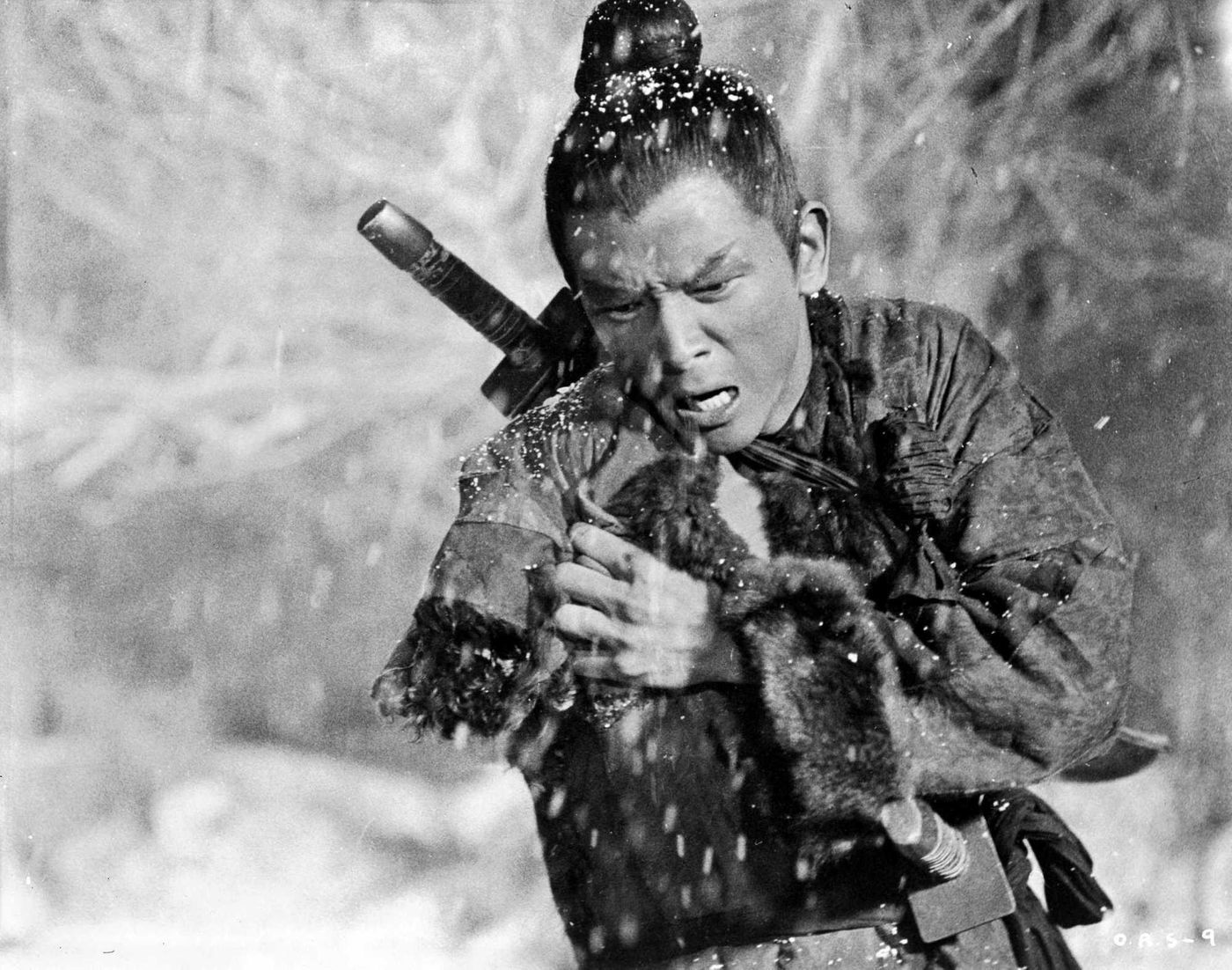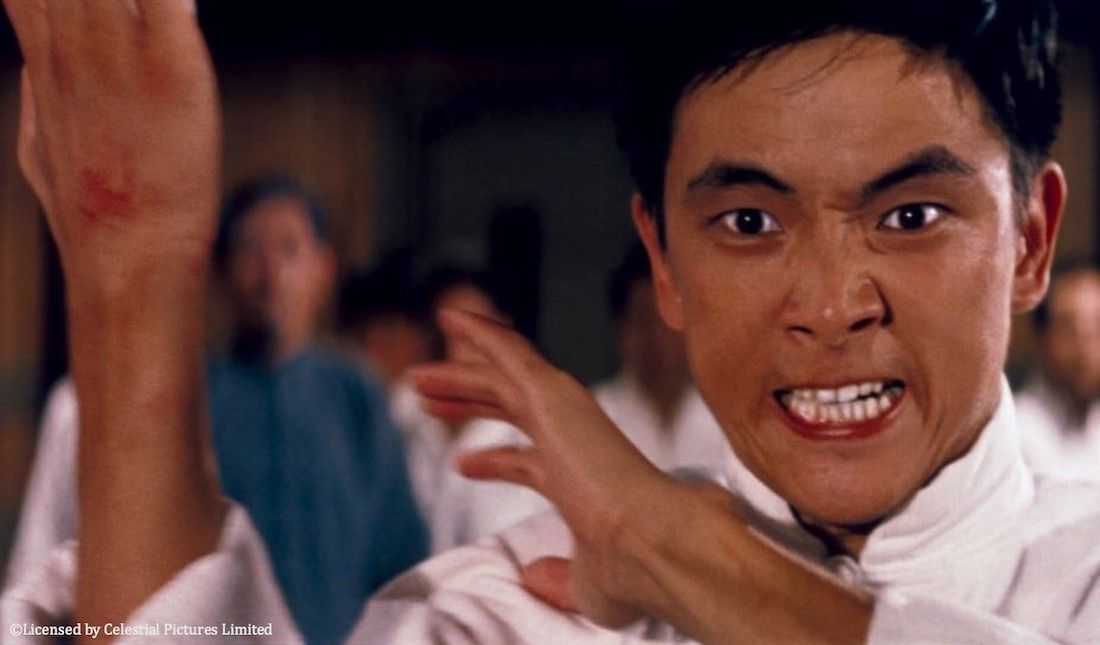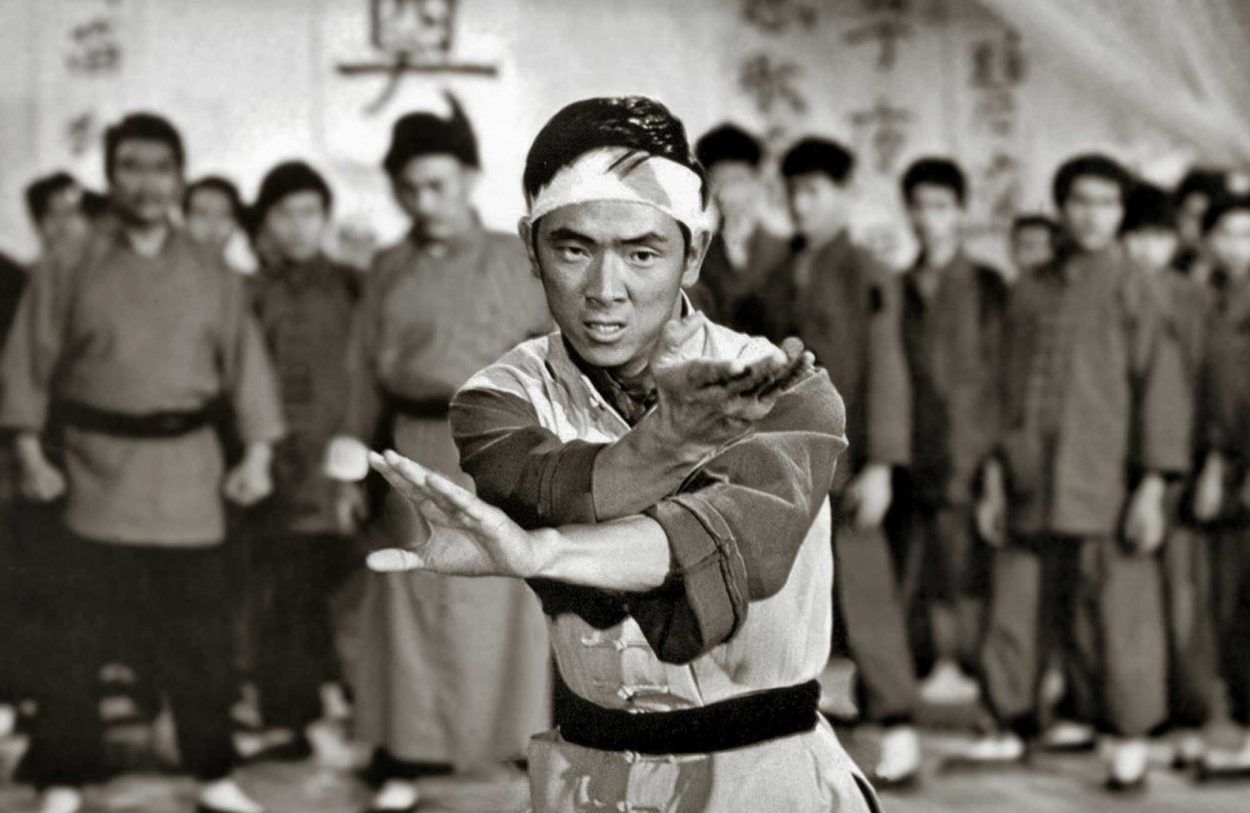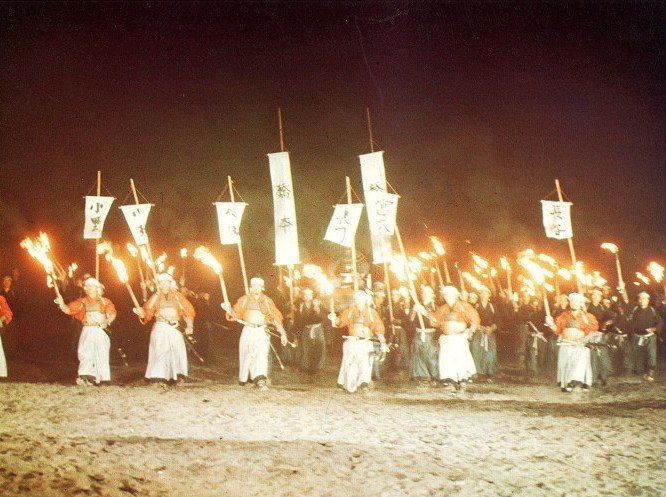Wang Yu: A superstar who plays well and directs! (Author: Quentin Tarantino)

Before the rise of Bruce Lee, the number one martial arts star in the Hong Kong film industry was Wang Yu, known in the United States as "Jimmy Wang Yu" (which, I must say, is more interesting). At that time in the Japanese film industry, they already had some orthodox action male stars. But in the 1950s and 1960s, the Hong Kong film industry did not have a star like Toshiro Mifune, Ken Takakura or Shintaro Katsu.
Until 1967, Wang Yu starred in "The One-Armed Swordsman" (The One-Armed Swordsman), produced by Shaw Brothers and directed by Zhang Che, a combination of John Ford and Sergio Leone in the martial arts film circle. The One Armed Swordsman, 1967). Like Hollywood movies in the 1940s and 1950s, most of the movies produced in Hong Kong at that time were targeted at women. Before Wang Yu, the biggest star in Hong Kong cinema was actress Ling Bo, who was extremely popular, playing both the heroine and the heroine (as did Brigitte Lin in the 1990s). The audience would rather see Ling Bo play a boy than a real actor.
But "One-Armed Swordsman" shook the Hong Kong film industry what Sergio Leoni's "A Fistful of Dollars" (1964) did in Italy. And all the martial arts movies we see now have emerged with the success of "One-Armed Swordsman". It was the first Hong Kong film to exceed one million at the box office; it made Wang Yu a big star in Hong Kong and even in Asia; it also made Zhang Che logically enter the ranks of "million dollar directors".
What makes Chang Cheh's film special is its masculine themes and violent aesthetic. Compared to the female-oriented Peking Opera-style Hong Kong movies at the time, it was more of the violence of Japanese samurai movies, and sword fighting was no longer just a ballet dance. Like the protagonist who had his arm cut off); when the characters were slashed by a sharp blade, flesh flew out.
But most importantly, the film focuses on Wang Yu, a handsome young man with a melancholy temperament. He is not Guan Dexing, the old man who grew up with the old audience, nor Ling Bo who disguised himself as a man, but a handsome and handsome male movie star who came out to take revenge. The success of this film made Wang Yu and Zhang Che the first action star/director team in the industry. They then made The Twin Swords (1965), The Assassin (1967), The Golden Swallow (1968) and One Arm for Shaw Brothers Pictures Return of the One Armed Swordsman (1969) and other classics. Wang Yu's acting career also reached its peak. He went to Japan and played the blind swordsman Zatou in the first Japanese-Hong Kong crossover film "Zatoichi Meets The One-Armed Swordsman" (1971). City's Japanese superstar Katsu Shintaro plays the opposite role.
At that time, although Wang Yu was already the biggest movie star in Hong Kong, he was still working for Run Run Shaw. The Shaw Brothers didn't mind making stars people liked, but they weren't willing to pay their dues, just as Herbert J. Yates, the mean head of Republic Pictures, didn't. Willing to pay his idol Gower Gulch Cowboy Stars. So Wang Yu chose the same path as Gene Autry. When Autry made it to the top singing cowboy on Saturday's matinee, he left Republic to make his own film. Wang Yu jumped from Shaw Brothers and moved to Taiwan's First Films & Union Film Company, which also produced "A Touch of Zen" (1970) and "Dragon Gate". Inn" [Dragon Gate Inn, 1967]), and Zou Wenhuai's Golden Harvest Pictures.
Zhang Che was very angry at Wang Yu's parting ways this time, and vowed in private to destroy Wang Yu and make Jiang David a greater action star than the former. Like what Herbert J. Yates wanted to do to Gene Autry, he dug up Leonard Slye and made it into Roy Rogers. Zhang Che did not hesitate to cooperate with David Jiang to make a remake of "The One-Armed Swordsman", and named it "The NEW One Armed Swordsman" (1971). In an interview with the media, he praised David Jiang and kept on slander Wang Yu. Although Jiang Dawei and Zhang Che have worked together in many good movies, including "Bodyguard" (Have Sword Will Travel, 1969), "Vengeance" (1970), "Duel Of The Iron Fist" (1971) and "Duel Of The Iron Fist" (1971) New One Armed Swordsman (The NEW One Armed Swordsman, 1971), etc., but Jiang David is not Roy Rogers after all, nor can he become Wang Yu. It wasn't until Zhang Che started working with Fu Sheng on filming that he found a real replacement for Wang Yu (sadly, like Bruce Lee, Fu Sheng passed away before his time came).

Wang Yu's departure from Shaw Brothers coincided with the fact that he himself started directing films. As a director, Wang Yu is also one of the greatest and most innovative directors in the history of martial arts movies. The last film he made for the Shaw Brothers, The Chinese Boxer (1970), was also his directorial debut, and it turns out that this film is even bigger than The One-Armed Swordsman in the history of martial arts films. more historic.
"Dragon and Tiger Fight" is the first of a masterpiece of kung fu movies directed by Wang Yu. Released in Hong Kong in 1970, it was one of the liveliest films in Asia that year, rivaled only by Kenji Misumi's Baby Cart at the River Styx. Zhang Che's films have set off a wave of action movies in Hong Kong and Taiwan, but they are all based on martial arts and swordsmanship; "Dragon and Tiger Fight" is the first movie in the martial arts genre that uses fists instead of swords. From that day on, Thus was born the kung fu fighting movie.
Later, whether in teahouses, casinos or martial arts halls, heroes single-handedly deal with a room of rogues, just like Western bar fights or quick duels, and become the main content of this type of film. But Wang Yu's first bare-handed confrontation in the casino in the movie "Dragon and Tiger" has never been surpassed. Only Bruce Lee's smashing trip to a Japanese karate school in Fist of Fury (1972) can rival it, and even then the latter is more due to Bruce Lee's personal ability than filmmaking success (Although Rowe's filmmaking abilities are much better than Bruce Lee or critics would rate him).
The Shaw Brothers sued Wang Yu for breach of contract and won that well-known lawsuit, which resulted in Wang Yu being unable to remain in Hong Kong to make films. After being forced to move to Taiwan, he proved the success of The Brave and the Evil (1971), his first post-Shaw Brothers film and his second film, The Brave and the Evil (1971). It is no accident that Wang Yu knows better than anyone else how to direct a Wang Yu film. It was his first collaboration with legendary Taiwanese action actress Shangguan Lingfeng (starring in Hu Jinquan's "Dragon Inn"), and they've been a dynamic pair ever since. Like Clint Eastwood and Sylvester Stallone, Wang Yu himself is the best director Wang Yu has ever worked with. Along with Zhang Che, Sun Zhong (Shaw Brothers' Kubrick), and Taiwanese action guru Li Zuonan, Wang Yu is the greatest filmmaker of the old-school kung fu era (and The Way of the Dragon). , 1972] proved that Bruce Lee was an untalented filmmaker). Just like Jackie Chan has done since, Wang Yu has a soft spot for exaggerated, visually stimulating action scenes that also make up a major part of his films.
But compared to the above-mentioned directors, Wang Yu's films have a unique visual design (in terms of actors, he is a real Chinese hero, but as a director, his influence is more derived from Japanese films). Fighting with two samurai in the snow in "Dragon and Tiger Fight"; the climax fight from night to day in "Black and White Road", the fatal blow of wet hand-to-hand combat in the castle moat in the same film; "God of War" ( The battle scene with torches burning on a beach at night in Beach of the War Gods, 1973). Like Eastwood, Wang Yu knows more about the type of film he's making than most, and he knows his own character better than anyone. Taking Taiwan as a new position, throughout the 1970s, Wang Yu participated in a series of violent and bloody action films, such as "The Last Duel" (The Last Duel, 1971) ), "Furious Slaughter" (1972), "Invincible Sword" (1972) and "Four Heavenly Kings" (Dragon Squad, 1974), which can be regarded as Wang Yu's "hard series" works; The crazy "Knight Errant" (1973) was changed to "Kung Fu Mom" when it was released in the United States, because Wang Yu's opponent in the movie was a fat old woman with strong martial arts; Guns (Blood of The Dragon, 1971). Compared with Wang Yu's other films, it has two big differences: First, it is one of the most violent films of all time. In the last hour of this 90-minute film, Wang Yu single-handedly and in his hands The spear blood washes the entire army; secondly, the director of this violent and bloody film is Gao Baoshu, the only female director in the martial arts genre.
After switching to Golden Harvest, Wang Yu collaborated with Luo Wei, the director who made Bruce Lee famous with "Big Brother Tangshan" and "Jingwumen" at that time, and made two brutal action films: "The Tattooed Dragon" (The Tattooed Dragon, 1973). and A Man Called Tiger (1973). "Cold Face Tiger" should be the third film that Luo Wei and Bruce Lee collaborated on. Some people say that Bruce Lee gave up the role because he wanted to direct his first film "Raptor Crossing the River". Luo Wei's statement is different, he claims that he prefers to let Wang Yu replace Bruce Lee in the film. I have a hard time believing the latter statement. If Bruce Lee were to appear in this movie, Jiahe would not say no. But obviously Wang Yu is a better choice. This also illustrates the change in Wang Yu's role after leaving the Shaw Brothers.
In general, in Shaw Brothers, Wang Yu played mostly heroic and righteous roles, and the villains and rogues were generally played by Luo Lie. After leaving Shaw Brothers, Wang Yu more often played the role of a bastard who was arrogant, outspoken, and robbing. For example, in "Cold Face Tiger," he didn't pretend to be a gang member to infiltrate the gang that killed his father. He really became a violent and cruel gang member. Sometimes, in some movies, you almost feel sorry for these bad guys in a way. It was during that time that he became popularly known as the "Steve McQueen of Asia".

His other three martial arts film masterpieces are Beach of the War Gods (1973), The One Armed Boxer (1972) and The One Armed Boxer (1972). The Master of the Flying Guillotine, 1976).
"God of War" (which is Wang Yu's most famous film in the UK) is Wang Yu's biggest budget and most shocking epic. (Annotation: Quentin's original text below and the plot of the movie are all different, here is properly compiled according to the plot of the movie) It tells a story that happened in Li Town, a seaside fishing village in China. A Japanese advance force came to the town and told the villagers that the Japanese army would arrive in ten days, and they needed to collect a sum of money before that, or all the villagers would be wiped out. The terrified fishermen could not scrape together such a large sum or understand the cruelty of the coming army. At this time, a mysterious wandering swordsman (played by Wang Yu) came to his aid and killed the Japanese samurai, while reassuring the villagers that they would go out and ask for help to come back to help defend against the arrival of the Japanese army.
The film is like Seven Samurai (1954) and Three Hundred Spartacus (Zack Snyder's 300 Spartacus [300, 2006] ] is more like a remake of Beach of War) an interesting mix of stories. From a cinematological point of view, this is Wang Yu's most Kurosawa-influenced film, but the fanatical anti-Japanese sentiment that fills the film makes it arrogant and ridiculous. One of the killers Wang Yu recruited replied to his conditions: "Generally, I have to pay to kill, but I can kill a few Japanese for free." Another said happily: "Kill the Japanese, why do you Why don't you tell me sooner?"
Japanese villains were the main theme of films in China, Hong Kong, South Korea, the Philippines and other countries at that time. In the movie "The Screaming Tiger" (1972), Wang Yu wants to avenge the Japanese who killed everyone in his hometown fishing village, so he goes to Japan and kills all the Japanese he meets. killed. The heroic focus of Luo Wei's "Jingwumen" is that Bruce Lee single-handedly smashed the Japanese karate school and injured dozens of Japanese soldiers in order to prove that "the Chinese are no longer the sick man of Asia". Similarly, Hap-ki-do (1972, US title: Lady Kung Fu) and When Taekwondo Strikes (1973, US title: Sting of the Dragon) directed by Hong Feng Masters), Hong Kong's petite fireball girl Mao Ying teamed up with Taekwondo master Li Junjiu to defeat the Japanese, or "Heroes defeating Japs" as Zhang Che's film title describes The Chinese name of the film is "The Legend of Warlocks", a 1981 film directed by Guo Zhui).
In the silent night, in the light of the burning torches, Wang Yu's magnificent battle scene on the beach of the God of War occupies the second half of the whole film. This is the most cinematic and impressive large-scale battle scene of all Hong Kong martial arts films of the 1970s. But this assessment seems too limited, this is a fucking great war scene . It completely crushes Orson Welles's overrated war scene in Chimes at Midnight (1965). The final duel between the wandering Chinese swordsman and the fully-armored Japanese samurai is so good it takes up so much of the second half of the movie that it starts to feel less like a martial arts flick and more like It is a historical war movie like Seven Samurai, Braveheart (1995) and Kingdom of Heaven (2005).

His other two classics, "The One-Armed Boxer" and its sequel, "The One-Armed Boxer," are Wang Yu's most well-known films in the United States. After mainstream audiences have moved to the new fads (Car Chase movies, Good Ol' Boy movies, Vigilante films, Star Wars-Jaws-Alien remakes), are those The avid black audience keeps this type of film alive in the cinema. These films are what made Wang Yu famous, and he modified them to better suit the audience of martial arts films. However, compared to the classic heroic chivalrous spirit in the movie "One-Armed Knife", "One-Armed Fighter" is like a bizarre and arrogant comic series, full of superheroes with superpowers and another group of superpowers who are tired of fighting. The fight between the villains, as if it was choreographed by Jack Kirby himself.
I'm not just doing this comparison now, I've said it long ago.
In the 1970s, these films were the closest thing to the mighty Marvel universe that was in theaters at the time, just a series of villain names and their "super" abilities (Kung Fu Beast, Karate Killer, Siamese) Demons, Tibetan Tantras, Taekwondo Masters, Judo Masters, and Invincible Yoga Masters), sounds like an Asian-themed lineup of supervillains, enough for a year of serialization of the Fantastic Four. In 1973, "The One-Armed Fighter" (US version title: The Chinese Professionals) was released in the United States at the time of the kung fu film boom. At that time, it was produced by National General Pictures. A number of Hong Kong imported films compete for theater resources, and Zhang Che's "New One-Armed Swordsman" and Wang Yu's "Dragon and Tiger Fight" were also released at the same time.
But "One-Armed Boxer", released in the late boom in 1977, topped Variety's charts and toured the Grindhouse for several years. Long. Along with Li Zuonan's film about Bruce Lee's life, Exit The Dragon, Enter The Tiger (1977), I've seen more Wang Yu films than any other chopsocky flick. Twice at The Carson Twin Cinema (where I've seen most of the films I've seen since critics start to question my own aesthetic), and at the trilogy at three different cinemas. screenings, once at The World Theatre on Hollywood Boulevard in Gower, which is Hollywood's premier theater of exploitation; On the same street; another time at The Palace in Long Beach (The Palace in Long Beach, which is a misnomer and can only be regarded as a theater, when the three consecutive films were "The Howling" [The Howling, 1981], "The Palace". Fulu Raiders" [Rolling Thunder, 1977] and "One-Armed Boxer"). Then KTLA Channel 5 bought the film and it was on a rotation in "Channel 5 Cinemas" in the early 80's, I recorded it on VHS from the TV and I can watch it anytime afterwards.
"One-Armed Boxer" did not have the same success as "Dragon Tiger Fight" or "God of War". Even compared to The One Armed Fighter, the sequel is a bit paltry, barely calling it a movie, with no full story or even little drama. The main reason leading the conflict in this story is that the one-armed boxer killed two disciples of the blood drop master Fengshen Wuji (a blind Tibetan tantra), and this happened before the start of this sequel movie, that is The two Tibetan Tantric disciples mentioned in "The One-Armed Boxer".
It might be hard to call "One-Armed Boxer" a good movie. But if you are a fan of this type of film, it should be easier to accept that it is a very good martial arts film. I've loved this movie since I was a kid, and as I've gotten older, my liking for it has grown. To the uninitiated, it might seem like a bunch of vulgar rubbish (like if I was going to make Peter Bogdanovich like martial arts movies, I wouldn't put One Arm The Boxer Breaks Blood Drops" as the first recommended film). But for a martial arts film connoisseur and Wang Yu movie fan, this is like a wine that only a connoisseur can appreciate out of the way!
|Original post on March 23, 2020, on the website of New Beverly Cinema , a movie theater owned by Quentin |Translation & Notes: Anonymous@黃影TRANSLATION
Like my work? Don't forget to support and clap, let me know that you are with me on the road of creation. Keep this enthusiasm together!

- Author
- More